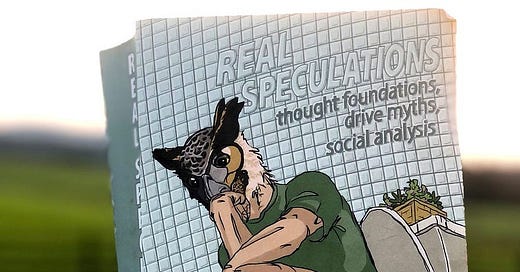‘[O]ne has to have one’s own spiritual skin and bones in the game’ if one is to think; we must ‘let the contradictions of one’s actual life positively inform the cultivation of one’s thought’ (pg 1). It is only in “risky thinking” that thinking will actually occur, and nothing that Cadell has ever written lacks ramifications for his life, our lives, and our world. Real Speculations is a book that we finish with a new framing of what needs to be taken seriously, which leaves us with an appreciation of how the book helps us avoid wasting time on non-primary problems, distractions, and routes that look promising but are ultimately dead-ends. ‘From the ‘existentialist excess’ itself,’ Cadell writes, ‘we must reprocess ‘theopolitical lack’ in order to build something that can withstand a world in the midst of a social apocalypse’ (5). “Tarrying with Social Apocalypse” — work and thinking that don’t contribute to this effort are problematic, but Cadell’s work helps us not unintentionally waste our time in a world where there is no time to waste.
If substance is subject, it follows that we must take our history and current moment seriously, for the subject is always bound to “now,” and hence we will only be able to think “subject/substance” in thinking not the past or future but the present: we ‘must tarry with the moment to moment historical process as it is unfolding, and surprising us, in that unfolding’ (10). Focusing on the past and future can be temptations to avoid facing the negativity of our moment, but this is a temptation Cadell always resists. Cadell begins his book tracing out the development of thought starting in New Age Atheism up to our moment, and we can think of Cadell as focused on Hegel’s “Absolute Knowing” while others, from Dawkins to Peterson, are thinking Reason, Spirit, or Religion. As Cadell writes, helping describe his work:
‘On the level of absolute knowledge, we must think of reason, spirit, and religion as a type of fractal structure unfolding in every individual and every society historically, and so long as humans exist, we might say ‘eternally.’ Here the position of absolute knowing overlaps with, not a position of totalizing positive knowledge, but rather the position of the crack in knowledge where things are incomplete, where action is abyssal, and thus reason and myth alike, must serve a truth that escapes both.’ (31)
Cracks, ruptures, lacks — Cadell argues that if we don’t think these, we will not think our moment, and self-effacement will prove nigh. What does it mean to think such? We must face contradiction, sexual difference, subjective destitution — all of which thinking can naturally be in the business of avoiding. Cadell warns us that ‘spirit cannot live on science and pragmaticism alone,’ which means ‘one must defend a concrete space for speculative cognition’ (131). But that is a space in which we suffer negativity, so we easily want to believe we can live on science and pragmaticism alone: if that’s not true, what might we have to face? A lot, but that’s why reading Cadell is a must: it prepares us for what we cannot plan.
‘To take on board dialectical logic is to build in real difference in your mental models so that they can actually move with the real of sociohistorical processes as sublation (that is a canceling and lifting to a higher level)’ (171). Dialectical thinking is a must today, and not only does Cadell make this claim, but he justifies it and shows why it is the case given our historic moment. We must think and move with “the unfolding” of our moment, a capacity afforded to us by dialectics, that also takes seriously that ‘all […] previous models of planning [are] fundamentally flawed because they seemed inspired by the pathways for personal development that only made sense in the 20th century’ (439). There was a time when they worked well enough, but that time — if we take ‘the technological singularity [as] fundamental’ — is over. (439). It is a mistake to think the present has nothing to do with the past, but it’s also a mistake to think new problems don’t arise.
Cadell is a gifted teacher, and he encourages everyone to read the greats — from Aristotle to Hume to Hegel and more — but ultimately all of these thinkers and classes about them are necessary but training grounds nevertheless. Every thinker in every age suffers a self-limitation: they are only alive in their time. ‘Philosophy is our time comprehended in thought,’ as Cadell puts it, and if there is to be philosophy today, it must be of our moment, which requires studying history to understand how our moment arose, but we must at the same time avoid the temptation to hide from today in history. ‘Only we can think our time, and that is ultimately our challenge’ — Cadell is right. With books like Real Speculations though, our time is a challenge we are both inspired and equipped to master.
.
.
.
For more by Cadell Last, please visit Philosophy Portal today:




